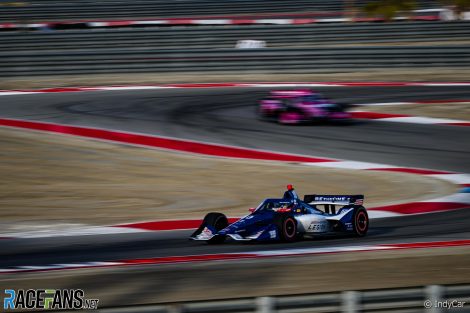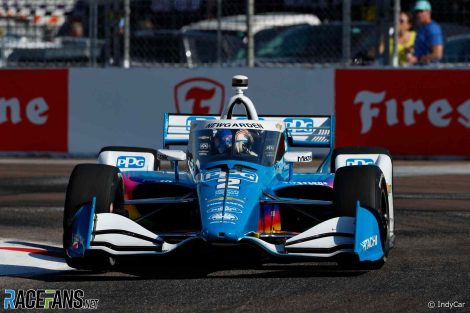There are no points on the table for the IndyCar drivers this weekend but there is a huge cash purse in what the series calls a “made-for-TV racing exhibition.”
The full, 27-car field will compete at a new venue, The Thermal Club road course in California. At 4.9 kilometres, this is the second-longest course IndyCar will race at this year, and its 17 turns make it one of the most complex layouts too.
Despite that, no more than half the cars will be in action at once during the competitive sessions. The field will be split into two for qualifying and the two heats which decide the starters for the 12-car final.
The event is being billed as the $1 Million Challenge, the prize available for the race winner. However each competitor will be paired with a member of the club, who they will share their earning with, meaning the winning driver actually receives $500,000. The promoter has also said “there will be a charitable component to the event” to raise funds for Martha’s Village and Kitchen, which provides care for homeless people.
The two-day event will be the first time IndyCar has held a non-championship competition since its teams raced at Surfers’ Paradise, Australia during its reunification season of 2008. While that event ran to its regular format, IndyCar has devised a special format for the Thermal Club meeting.
It will begin with nine hours of testing, split across four sessions, two each on Friday and Saturday. The track should therefore be well rubbered-in by the time qualifying begins.
Qualifying
Two random draws will be held before the action begins. One will assign each driver to a member of The Thermal Club, who will share in their winnings. The other draw will split the field into two groups.
Instead of IndyCar’s usual knockout qualifying format, the two groups will each have a 12-minute qualifying session. Group one’s session will set the starting positions for heat one, and group two will do the same for heat two.
For qualifying, each driver will have one set of tyres and 40 seconds of push-to-pass. The timing clock will be stopped the first time a red flag is shown but not for any subsequent stoppages.
Advert | Become a RaceFans supporter and
Heats
The two heat races will decide the grid for the ‘All-Star’ final. Each heat will last for 10 laps, with a maximum time limit of 20 minutes.

In a…
Click Here to Read the Full Original Article at RaceFans…

